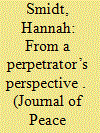| Srl | Item |
| 1 |
ID:
133883


|
|
|
|
|
| Publication |
2014.
|
| Summary/Abstract |
Access to public health care has often been equated with health outcomes. Outcomes-based analysis often misunderstands the process of access to health. This article conceives access to health as a bundled concept and decomposes access into availability, affordability and acceptability. Access to health is determined by public provisioning as well as by socio-economic characteristics of households. It attempts to examine these dimensions across different regions of the Indian state of Uttar Pradesh (UP). It shows that there are variations across regions and socio-economic characteristics of households. A particular group from one region may not have the same degree of access as its counterpart in another region and at the same time there are variations across groups in the same region. The scale of development of regions also plays an important role in promoting or hindering access to health.
|
|
|
|
|
|
|
|
|
|
|
|
|
|
|
|
| 2 |
ID:
144086


|
|
|
|
|
| Summary/Abstract |
Do international election observers deter or spur violence after election day? This article argues that only when conceptually and empirically distinguishing between violence by governments and opposition groups, can we assess the impact of international election observation. Disaggregating post-electoral violence uncovers that observers can deter governments from using force, but they have the opposite effect on opposition groups. When expecting criticism from observers, opposition leaders can easily deny their responsibility for violence by individual party militants, while weaponry and official insignia betray police and military involvement in violence and force the government to bear command responsibility. Governments also anticipate higher international costs for engaging in post-electoral violence than opposition groups, which are not usually targets of international punishment. On the other hand, international election observers unintentionally incite opposition groups to organize violence, as opposition groups seek to benefit from international attention and support that come with the presence of observers. Observers’ exposure of fraud reverses this differential effect: because governments expect international costs for election rigging anyway, observers cannot deter repression after highly fraudulent elections. But their alertness to electoral malpractice alleviates opposition groups’ incentives for post-electoral violence. Using data on 230 state-wide elections in Africa from 1990 to 2009, the analysis supports the observable implications of this argument. The findings of this article imply that international election observation missions make the post-electoral environment more peaceful when it comes to government repression after non-fraudulent elections. But observers ought to develop greater local expertise to identify opposition grievances before these groups resort to violence and be attentive to the possibility of increased repression after exposing cheating.
|
|
|
|
|
|
|
|
|
|
|
|
|
|
|
|